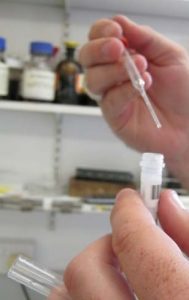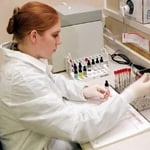Ron Hines DVM PhD
This article has nothing to do with human LDL Cholesterol
 See What Normal Blood & Urine Values Are
See What Normal Blood & Urine Values Are

Your Dog or Cat’s LDH Level = Lactate Dehydrogenase
Lactate dehydrogenase (LD) is an enzyme that is found in healthy cells in many places in your pet’s body. There, It helps in the converting of blood glucose into the energy that cells need to survive (glycolysis).
The cells that make up your pet’s muscles, heart, kidney, liver and red blood cells demand the most energy, so they contain substantial amounts of LDH. It is normal for some LDH to be present in your pet’s blood; but when lots of it escapes from its reservoir within cells, it is because those cells have been injured.
Reasons Why Your Pet’s Lactate Dehydrogenase Levels Might Be High:
Because LDH can originate from so many different locations, finding too much of it in your pet’s blood will not tell your veterinarian what your pet’s health problem is. But if the LDH levels did not rise because of some technical collection or blood processing error, it does tell your veterinarian that your pet does, indeed, have a health issue.
That can be very important. Our pets are incredibly sensitive to their environment and family issues. They can’t tell us why they are acting unusual, disinterested in eating or experiencing digestive issues. Finding an elevated LDH level (as when finding a high C-reactive protein level or ESR) affirms that you did the right thing in bringing the pet in.
Because lots of LDH resides in your pet’s muscle, heart, red blood cells, liver and kidneys, those are often the site of the excess LDH is coming from. Hopefully, the other tests on a blood chemistry panel will help point out which organ system that is.
LDH levels can also rise in your pet following strenuous exercise, in the presence of some malignant tumors, heart disease, red blood cell destruction (intravascular hemolysis, hemolytic anemias) and acute pancreatitis.
Processing errors: If your pet’s blood sample sits too long before it is centrifuged and separated, LDH levels can be falsely increased. If the red blood cells fracture (lyse, hemolyzed) while they are withdrawn from your pet’s vein or in tube transfer, LDH levels will also go up falsely.
Complementary Tests:
CK level to help determine if the LDH is from muscle, perhaps an elevated ALT level if the LDH is from liver, a CBC/ WBC and blood chemistry panel, secondary tests chosen by your veterinarian based on what those initial results are.
DxMe



